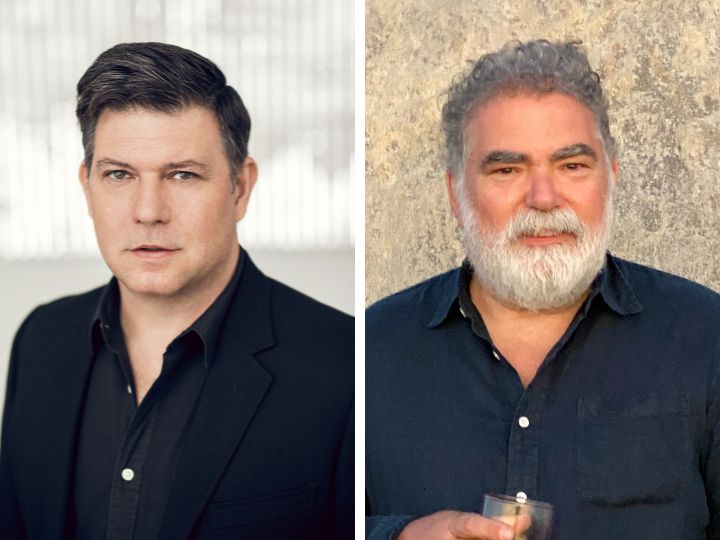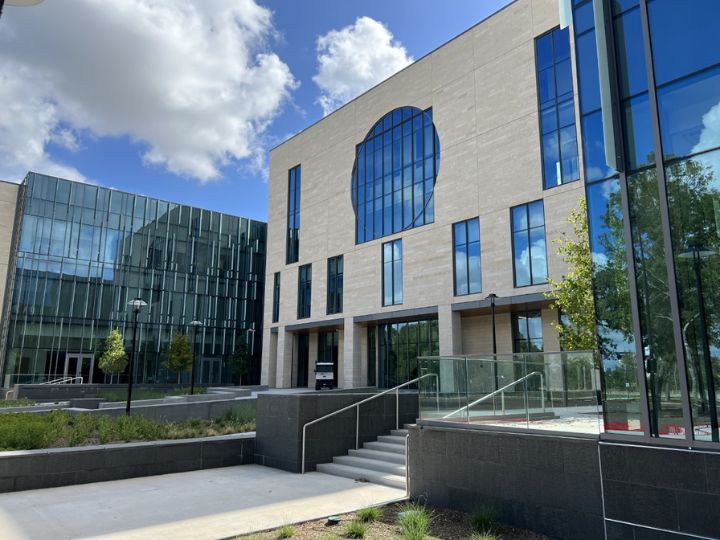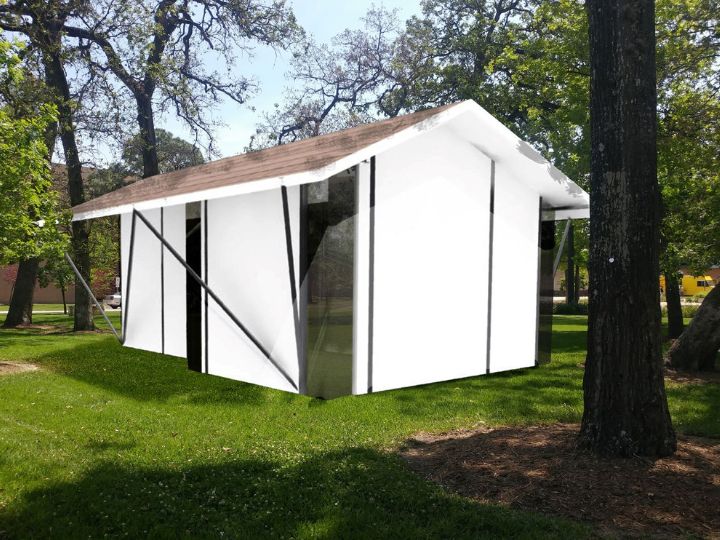


Public Art of the University of Houston System (Public Art UHS), an arts organization that enriches and serves multiple campuses across the UH System and the greater Houston community with one of the most significant university-based art collections in the United States, announces the installation of two new site-specific commissions and the acquisition of 20 works by some of the most dynamic artists working from Houston today, all of which will be on public view this fall.
Commissions include a permanent light sculpture by the American artist Leo Villareal for the new Tilman J. Fertitta Family College of Medicine and a temporary, large-scale architectural installation by Mexico-based Cuban-American artist and sculptor Jorge Pardo for Wilhelmina's Grove, both at the University of Houston. These new installations and acquisitions further the mission of Public Art UHS to collect and show artworks that are representative of and accessible to the diverse communities that it serves throughout greater Houston and Southeast Texas.
"As one of the most significant university-based art institutions in the United States, displaying works that are exemplary of a dynamic, engaging and diverse arts community is of the utmost importance to us," said María C. Gaztambide, Public Art UHS executive director and chief curator. "During a period of strategic planning timed to the institution's 50th anniversary, we took the time to assess our current collection of nearly 700 works. With this stewardship completed and a plan established to guide collection development moving forward, we are thrilled to continue adding to our collections and programing, particularly with these important commissions and recent acquisitions."
Each of the new commissions represents a different pillar of Public Art UHS's work as an all-encompassing arts organization, which enriches the daily lives of UH System's more than 74,000 students and nearly 10,000 faculty and staff, as well as the diverse communities throughout Greater Houston and Southeast Texas, through temporary exhibitions, robust public programming, research, education and broad community outreach.
Leo Villareal
Artist Leo Villareal's site-specific commission for the University of Houston's new Tilman J. Fertitta Family College of Medicine transforms a limestone wall within the center of the Page-designed building into a space for gathering, contemplation and connection. The two-dimensional, planar monochromatic light sculpture features 90 mirrored stainless steel LED fixtures and contains 3,960 white LED nodes, which are bright enough to be visible during periods of full sun. The optically potent combination of materials both reflects and emits light, creating a luminous field of floating particles. Villareal's work will be on view to the public beginning in October 2022, timed to the opening of the Fertitta Family College of Medicine building.
"Public Art UHS's permanent collection provides the university audience and beyond with opportunities to encounter art, often when and where they least expect it," explained Gaztambide. "Villareal's piece at the new Fertitta Family College of Medicine will take this to a new level, serving as a 'digital hearth' for students, faculty and visitors, allowing for personal reflection while also deepening connections within the larger community."
Villareal will sequence the artwork to create compositions that respond to and complement the activity in the surrounding area, so that the light patterns will, as the artist describes, "unfurl in orchestrated, scholastic rhythms" and transform the surrounding area into a space of connected presence.
"Like the College of Medicine itself—an institution of diverse yet connected disciplines and people—the immersive artwork will encourage connection as the true heart of the new building," Villareal said.
Jorge Pardo, "Folly"
This fall, Public Art UHS will also unveil "Folly" by Jorge Pardo, one of the artist's most ambitious large-scale architectural installations to date. "Folly" marks the third project in Public Art UHS's temporary public art program and the second site-specific Grove Commission developed for Wilhelmina's Grove, a serene on-campus gathering space anchoring the UH Arts District.
Pardo's artworks employ vibrant colors, eclectic patterns and a variety of materials and scales to explore the intersection of contemporary painting, design, sculpture and architecture. For his Grove Commission, he plays with the concept of a folly—a purely ornamental building without purpose—to invite the community to question distinctions between fine art, architecture and design. The immersive piece features a pavilion-like structure made of steel and waterproof panels, with an interior adorned by laser-cut, hand-painted wood wall panels and illuminated by Pardo's signature sculptural chandeliers.
"One of the goals of our Grove Commissions is to challenge artists to delve into uncharted territories by expanding the reach and scale of their work," said Gaztambide. "We are honored to provide a space for Pardo's continued creative experimentation through 'Folly' and are excited to share with our public his unique approach to art-making and architecture."
Pardo's outdoor work will complement the more than 350 artworks on public view both indoors and outdoors around UH's sprawling 594-acre campus—which include sculptures from Carlos Cruz-Diez and Brian Tolle, architecturally integrated work from Frank Stella and Alyson Shotz, along with long-term loans by internationally acclaimed artists Sarah Braman, Tony Smith or Odili Donald Odita.
New Acquisitions
Public Art UHS will finalize the installation of 20 new works by Houston-based artists acquired over the past year. Many of the works, which range from paintings to works on paper to sculptures, will be permanently sited at the John M. O'Quinn Law Building, opening to students and the general community in time for the fall semester. Featured works include an early painting by Bert L. Long, Jr., one of the co-founders of Project Row Houses; a diptych from UH graduate Jamal Cyrus's "Eroding Witness" series; a textile sculpture from former UH faculty member Kaneem Smith; a series of etchings from the El Paso-born, Houston-based artist Adriana Corral; and more.
Two assembled wood sculptures— "O La Loo" (1999) and "Long Tail Many Horns" (1998)—were acquired from Jesse Lott, another Project Row Houses founder, for the newly completed Advancing Community Engagement and Services (ACES) Institute at UH. The remainder of the new acquisitions will be installed at University of Houston-Downtown, including Adriana Corral's "Impunidad, círculo vicioso" and Bert L. Long, Jr.'s "The Couple (Chest of Material Wealth)" (1977).
"When considering new acquisitions, bringing in artists and artworks that reflect our mission to promote dialogue, enrich the cultural and intellectual character of our universities, and connect with diverse audiences is our top priority," explained Gaztambide. "These new works more than meet those requirements, and we are proud to continue our longstanding efforts to showcase artists from all backgrounds and experiences, many of which are from the Texas region."
In addition to these new acquisitions and the re-siting of existing collection artworks at the John M. O'Quinn Law Building, Public Art UHS announces a new commission for the building's first floor by artist-activist, UH professor and Project Row Houses co-founder Rick Lowe, set to be unveiled in Spring of 2023. Drawing on his extensive work in the community, Lowe's work—entitled "The Line" —references the implicit boundary between Houston's Third Ward and the University of Houston and questions the necessity of this dividing line, which was originally designated to preserve the neighborhood's character and history. The abstract painting will incorporate Lowe's signature use of collage and color on panels.






